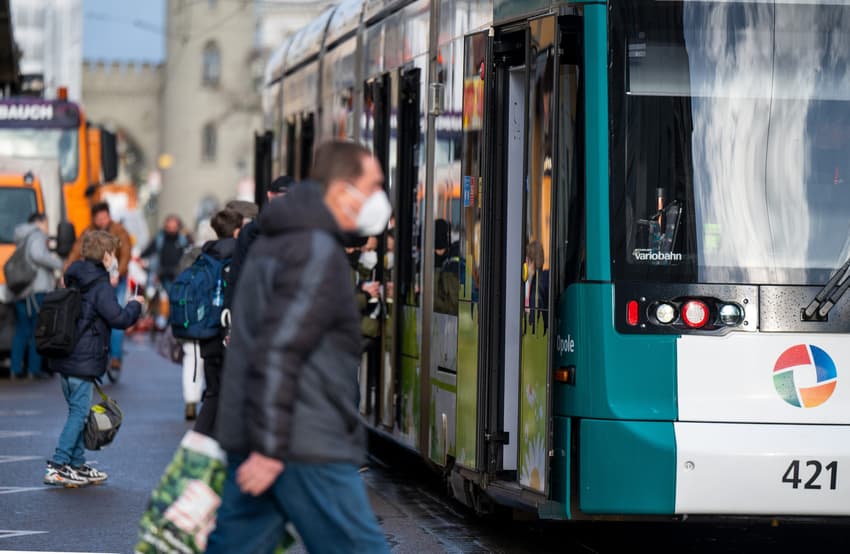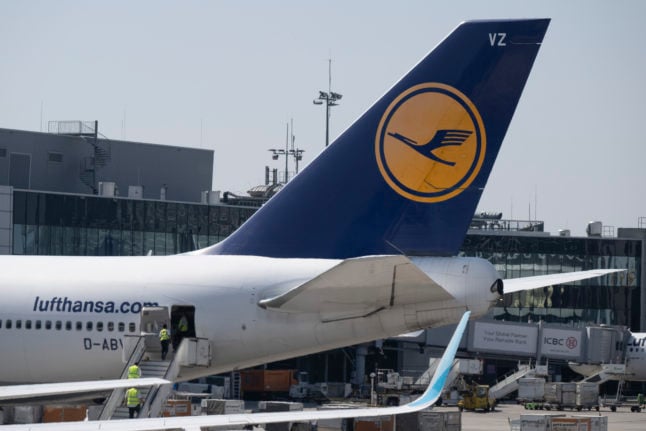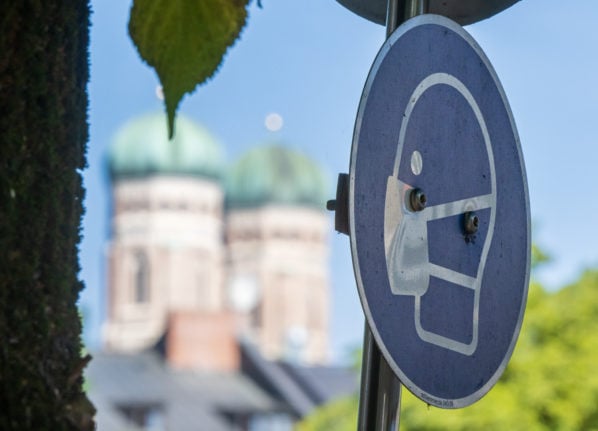KEY POINTS: Germany's new Covid-19 rules from October

Germany is preparing for the colder months with a new set of Covid regulations. Here's what you need to know about the rules - and changes.
What's happening?
Germany has agreed on amending the Infection Protection Act which forms the legal basis for any Covid-19 measures.
The plan includes some measures that will apply nationwide, while the states can also decide on regional requirements depending on the pandemic situation.
On Friday September 16th, the Bundesrat, which represents the states, gave its approval.
With the fresh set of rules, the coalition, made up of the Social Democrats (SPD), Greens and the Free Democrats (FDP), is trying to prepare Germany for pandemic developments during autumn and winter. The new legal framework will apply from October 1st to April 7th 2023.
READ ALSO: Germany to bring in new Covid rules ahead of 'difficult winter'
Here are some of the changes at a glance:
Mandatory masks on long-distance trains
People travelling on long-distance trains in Germany will still have to wear an FFP2 mask if they are over the age of 14. For children between the ages of six and 13, a surgical mask is sufficient.
READ ALSO: Germany to enforce new Covid rules from October 1st
No mask mandate on planes
At the moment, people on flights to and from Germany, as well as domestic flights, still have to wear a face mask, but this will no longer be a requirement from October 1st under the new rules. The German government can, however, reintroduce mandatory masks on aeroplanes by decree if it deems it necessary in light of rising case numbers.

A Lufthansa airplane at Frankfurt airport. Photo: picture alliance/dpa | Boris Roessler
It comes after outrage was sparked when ministers – including Chancellor Olaf Scholz – were seen without masks on a government trip to Canada recently.
READ ALSO: ‘Double standards’: Why top German ministers are embroiled in a Covid row
Mask and test rule in hospitals and nursing homes
A tightening of the rules affects hospitals, clinics and nursing homes. In these settings, people have to wear an FFP2 mask and show a negative Covid-19 test result.
In order to strengthen the protection of those in need of care who are particularly at risk, nursing homes have to appoint representatives who will take care of vaccinations, hygiene and any other treatment for those who fall ill, for example with the drug Paxlovid.
Masks when visiting doctor
FFP2 masks are now also a requirement in doctors' offices and other outpatient medical facilities. Previously, this could be regulated by the states, but now the federal government will regulate this uniformly.
State rules for local transport, schools and public spaces
In some areas, the government is not putting in place nationwide measures. Instead, German states will be able to bring in tighter regulations by decree. These include making masks mandatory on local public transport. It is expected that the mask mandate will remain in public transport, after a meeting from the state health ministers.
States can also choose to bring in compulsory masks in other publicly accessible indoor spaces such as restaurants or shops. This will depend on the Covid situation.
Exceptions to mandatory mask orders issued by the states
Exceptions to having to wear a mask apply will apply in certain areas. For instance, at recreational, cultural, and sporting events, as well as in the food service industry, a mask does not have to be worn by anyone who can present a current negative test. Furthermore, anyone who has recently recovered or received a Covid vaccination no more than three months ago can be exempt from the mask requirement. However, the states can decide for themselves whether they want to allow these exemptions to apply.

A sign urging people to wear masks in Munich. Photo: picture alliance/dpa | Peter Kneffel
READ ALSO: OPINION - Germany's autumn Covid rules are a giant mess beyond parody
Possible masks and tests in schools
When it comes to schools, masks can be made compulsory for students from the 5th grade onwards. States can decide if regular testing is needed at schools and in daycare (Kitas). States may also mandate mandatory testing in other community settings - such as asylum seeker shelters.
Meanwhile, if a school pupil is suspected of having a Covid infection, a medical certificate will not have to be submitted to enable the child to attend school again unlike previously envisaged. This was scrapped from the final version of the plans.
If parents have to stay at home due to a child's illness, those with statutory health insurance will continue to receive additional sick days for kids until the end of 2023. Each parent receives 30 working days per child. Single parents will receive 60 working days. The number of days have been extended during the pandemic.
Tougher measures can be implemented by state parliaments
If approved by state parliaments, then regions in Germany can bring in additional, tougher measures. This would be the case if they see a danger to the functioning of critical infrastructure, such as healthcare, energy supply or emergency services. For instance, if too many people are off sick at the same time or have to quarantine, this can cause major problems.
In this instance, states can order mandatory masks in outdoor areas if a minimum distance of 1.5 meters cannot be maintained. In addition, upper limits for visitors at indoor events are possible.
The exceptions for Covid-vaccinated, recently recovered and tested people would then no longer apply. However, lockdowns, business and school closures are not envisaged - even in a critical situation.
Note that at this stage, these measures have to be voted in by regional parliaments, not by decree.
What else should I know?
Germany's current Infection Protection Act runs out on September 23rd. That leaves a space between this date and October 1st where there would apparently be no legal basis for any Covid rules.
We asked the German Health Ministry what happens during this short period. A spokesman told us that the current laws "will be extended" until October 1st. So things will remain as they are until the start of October.
Comments
See Also
What's happening?
Germany has agreed on amending the Infection Protection Act which forms the legal basis for any Covid-19 measures.
The plan includes some measures that will apply nationwide, while the states can also decide on regional requirements depending on the pandemic situation.
On Friday September 16th, the Bundesrat, which represents the states, gave its approval.
With the fresh set of rules, the coalition, made up of the Social Democrats (SPD), Greens and the Free Democrats (FDP), is trying to prepare Germany for pandemic developments during autumn and winter. The new legal framework will apply from October 1st to April 7th 2023.
READ ALSO: Germany to bring in new Covid rules ahead of 'difficult winter'
Here are some of the changes at a glance:
Mandatory masks on long-distance trains
People travelling on long-distance trains in Germany will still have to wear an FFP2 mask if they are over the age of 14. For children between the ages of six and 13, a surgical mask is sufficient.
READ ALSO: Germany to enforce new Covid rules from October 1st
No mask mandate on planes
At the moment, people on flights to and from Germany, as well as domestic flights, still have to wear a face mask, but this will no longer be a requirement from October 1st under the new rules. The German government can, however, reintroduce mandatory masks on aeroplanes by decree if it deems it necessary in light of rising case numbers.

It comes after outrage was sparked when ministers – including Chancellor Olaf Scholz – were seen without masks on a government trip to Canada recently.
READ ALSO: ‘Double standards’: Why top German ministers are embroiled in a Covid row
Mask and test rule in hospitals and nursing homes
A tightening of the rules affects hospitals, clinics and nursing homes. In these settings, people have to wear an FFP2 mask and show a negative Covid-19 test result.
In order to strengthen the protection of those in need of care who are particularly at risk, nursing homes have to appoint representatives who will take care of vaccinations, hygiene and any other treatment for those who fall ill, for example with the drug Paxlovid.
Masks when visiting doctor
FFP2 masks are now also a requirement in doctors' offices and other outpatient medical facilities. Previously, this could be regulated by the states, but now the federal government will regulate this uniformly.
State rules for local transport, schools and public spaces
In some areas, the government is not putting in place nationwide measures. Instead, German states will be able to bring in tighter regulations by decree. These include making masks mandatory on local public transport. It is expected that the mask mandate will remain in public transport, after a meeting from the state health ministers.
States can also choose to bring in compulsory masks in other publicly accessible indoor spaces such as restaurants or shops. This will depend on the Covid situation.
Exceptions to mandatory mask orders issued by the states
Exceptions to having to wear a mask apply will apply in certain areas. For instance, at recreational, cultural, and sporting events, as well as in the food service industry, a mask does not have to be worn by anyone who can present a current negative test. Furthermore, anyone who has recently recovered or received a Covid vaccination no more than three months ago can be exempt from the mask requirement. However, the states can decide for themselves whether they want to allow these exemptions to apply.

READ ALSO: OPINION - Germany's autumn Covid rules are a giant mess beyond parody
Possible masks and tests in schools
When it comes to schools, masks can be made compulsory for students from the 5th grade onwards. States can decide if regular testing is needed at schools and in daycare (Kitas). States may also mandate mandatory testing in other community settings - such as asylum seeker shelters.
Meanwhile, if a school pupil is suspected of having a Covid infection, a medical certificate will not have to be submitted to enable the child to attend school again unlike previously envisaged. This was scrapped from the final version of the plans.
If parents have to stay at home due to a child's illness, those with statutory health insurance will continue to receive additional sick days for kids until the end of 2023. Each parent receives 30 working days per child. Single parents will receive 60 working days. The number of days have been extended during the pandemic.
Tougher measures can be implemented by state parliaments
If approved by state parliaments, then regions in Germany can bring in additional, tougher measures. This would be the case if they see a danger to the functioning of critical infrastructure, such as healthcare, energy supply or emergency services. For instance, if too many people are off sick at the same time or have to quarantine, this can cause major problems.
In this instance, states can order mandatory masks in outdoor areas if a minimum distance of 1.5 meters cannot be maintained. In addition, upper limits for visitors at indoor events are possible.
The exceptions for Covid-vaccinated, recently recovered and tested people would then no longer apply. However, lockdowns, business and school closures are not envisaged - even in a critical situation.
Note that at this stage, these measures have to be voted in by regional parliaments, not by decree.
What else should I know?
Germany's current Infection Protection Act runs out on September 23rd. That leaves a space between this date and October 1st where there would apparently be no legal basis for any Covid rules.
We asked the German Health Ministry what happens during this short period. A spokesman told us that the current laws "will be extended" until October 1st. So things will remain as they are until the start of October.
Join the conversation in our comments section below. Share your own views and experience and if you have a question or suggestion for our journalists then email us at [email protected].
Please keep comments civil, constructive and on topic – and make sure to read our terms of use before getting involved.
Please log in here to leave a comment.